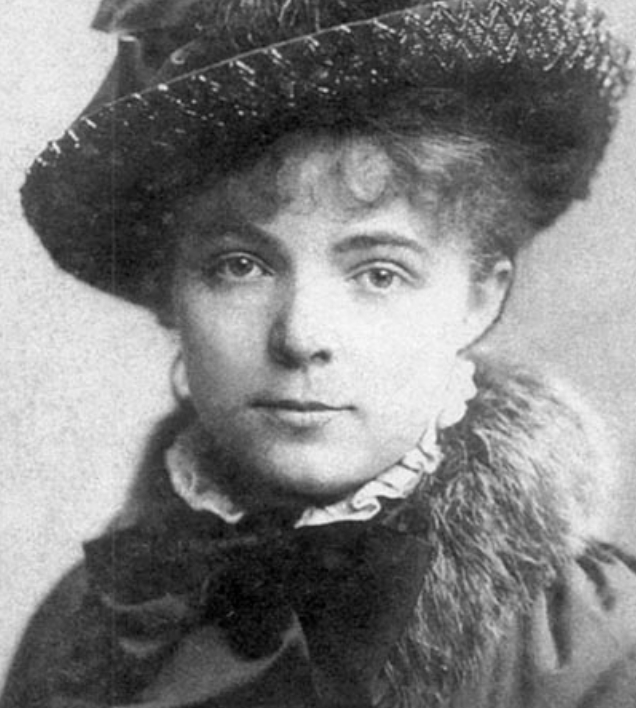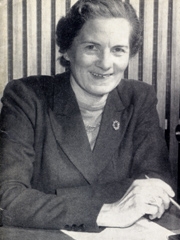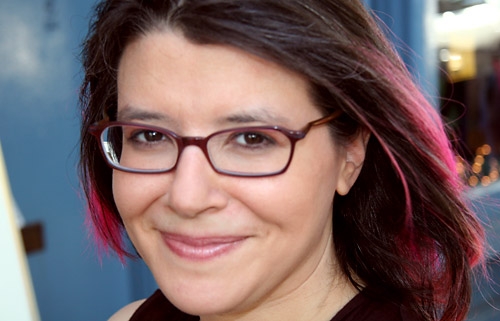November 23
Marie Bashkirtseff

On this date in 1858, artist Marie Bashkirtseff was born in what is now Ukraine to a wealthy noble family. She grew up in France and Italy and studied painting in Paris. Although a number of her paintings were destroyed by the Nazis during World War II, she is still well-known for two canvasses: “The Meeting,” depicting Parisian slum children, and “In the Studio,” depicting fellow artists at work.
From the age of 13, she kept a journal that included her correspondence with writer Guy de Maupassant. The first volume of her diary was published in 1890 and is titled I Am the Most Interesting Book of All. She wrote several articles for Hubertine Auclert’s feminist newspaper La Citoyenne in 1881 under the nom de plume “Pauline Orrel.” One of her most-quoted sayings: “Let us love dogs, let us love only dogs! Men and cats are unworthy creatures.”
Her later journal entries, first published posthumously in the journal Revue des Revues in 1900, reveal her skepticism. Her religious beliefs were complicated and shifted during her short life. In 1881 she wrote about “having been a Deist, with days of absolute atheism,” while adding she was “praying to Christ and the Virgin” and commenting that established religion had very little to do with Christ’s teaching.
She died of tuberculosis at age 25 in Paris. (D. 1884)
PHOTO: Bashkirtseff at age 20.
“The Church has lowered God, disfigured religion, or, rather, has created, instead of the worship we owe to God, a complicated religion, full of charlatanism, which must be destroyed.”
— "The Journal of Marie Bashkirtsef," translated with an Introduction by Mathilde Blind (1890)
Margaret K. Knight

On this date in 1903, psychologist Margaret Kennedy Knight, née Horsey, was born in Hertfordshire, England, earning her bachelor’s degree at Girton, Cambridge, in 1926 and her master’s in 1948. “I had been uneasy about religion throughout my adolescence, but I had not had the moral courage to throw off my beliefs until my third year in Cambridge,” she wrote in the 1955 preface to Morals Without Religion. “A fresh, cleansing wind swept through the stuffy room that contained the relics of my religious beliefs. I let them go with a profound sense of relief, and ever since I have lived happily without them.”
She married Arthur Knight, a professor of psychology, in 1936, then moved with him to Aberdeen, Scotland, and lectured at the University of Aberdeen from 1936-70. She and her husband co-wrote several textbooks. She became a celebrity across Great Britain when she achieved the coup of promoting freethought on BBC Radio. Seeking to uncouple moral education from religion, Knight had submitted a draft script in 1953 after long negotiations. The BBC finally agreed that as a psychologist, she could broaden her approach to include “positive advice to non-Christian parents on the moral training of children.”
The fireworks started after her first talk in January 1955 was written up in newspapers, including the Sunday Graphic story headlined “The Unholy Mrs. Knight” describing her as “a menace.” The BBC lectures appeared in her 1955 book Morals Without Religion. In 1961 she edited Humanist Anthology From Confucius to Bertrand Russell (revised in 1995 by James Herrick) and updated her views on religion in the 1975 pamphlet “Christianity: The Debit Account.” (D. 1983)
“Ethical teaching is weakened if it is tied up with dogmas that will not bear examination.”
— Knight, "Morals Without Religion" (1955)
Jennifer Michael Hecht

On this date in 1965, poet and historian Jennifer Michael Hecht was born in New York City. She earned a B.A. in history from Adelphi University in New York in 1987 and a Ph.D. in the history of science and European cultural history in 1995 from Columbia University. Her works include The Next Ancient World (2001), for which she was awarded the Poetry Society of America’s Norma Farber First Book Award.
Hecht is known primarily for her historical and philosophical books: Doubt: A History (2003); The End of the Soul: Scientific Modernity, Atheism, and Anthropology in France (2003), The Happiness Myth: Why What We Think Is Right Is Wrong (2007) and Stay: A History of Suicide and the Arguments Against It (2013).
Hecht has written for The New York Times, Washington Post, Boston Globe, Philadelphia Inquirer, Politico, Vox, Poetry and The New Yorker. She holds a Ph.D. in the history of science/European cultural history from Columbia University (1995) and has taught in the MFA program at Columbia University and the New School in New York City. She and her husband, John Chaneski, have two children.
“I’m sort of what I’ll now call a Reagan atheist — came in real early. I was still a pretty young person,” Hecht said during her speech at FFRF’s 32nd annual convention. In her book Doubt: A History (2003), Hecht detailed the extensive history of atheism and religious skepticism, writing, “Doubters have been remarkably productive, for the obvious reason that they have a tendency toward investigation and, also, are often drawn to invest their own days with meaning.” Hecht received FFRF’s 2009 Freethought Heroine Award.
“Almost all the great poets have conversations in their poetry about doubting God, and even go all the way to dismissing. It’s such a strong tradition that it’s almost amazing that we’ve missed it.”
— Hecht speech at FFRF’s 32nd annual convention (Nov. 7, 2009)
